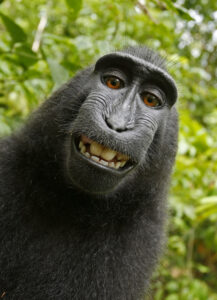The Ninth Circuit recently ruled in its case concerning monkey selfie photographs.
As many remember, in 2011, while visiting an Indonesian rainforest, nature photographer David Slater left his camera unattended. According to Slater, a monkey known as Naruto, picked up Slater’s camera and took multiple “selfies”. The selfies went viral.

After Slater used the photographs in a book that he published, PETA sued Slater for infringing the monkey’s copyright. The questions became: Does PETA have standing to sue on behalf of Naruto? If so, is a monkey an author for purposes of the Copyright Act of 1976?
In September of 2017, the parties settled the case and filed a joint motion to dismiss – but the Ninth Circuit refused to grant their motion to dismiss. Last month it became clear why. The three judge panel ruled that not only did PETA lack “next friend” status to bring the lawsuit on behalf of Naruto, Naruto – because he is an animal – does not have standing to sue under the Copyright Act. Bound by the earlier Ninth Circuit decision in Cetacean v. Bush, which stands for the proposition that animals do not have standing to sue unless Congress explicitly writes it into the statute, the Ninth Circuit held that monkeys can’t sue under the Copyright Act.
However, the Ninth Circuit didn’t stop there. The three judge panel questioned PETA’s motivations behind the suit and even wrote that PETA failed to be a friend to Naruto. The Court wrote, “[p]uzzlingly, while representing to the world that ‘animals are not ours to eat, wear, experiment on, use for entertainment or abuse in any other way,’ PETA seems to employ Naruto as an unwitting pawn in its ideological goals.”
If you have questions about copyright law, Goodell DeVries can help. Contact Jim Astrachan at 410-783-3520 (jastrachan@gdldlaw.com) or Kaitlin Corey at 410-783-3526 (kcorey@gdldlaw.com).
